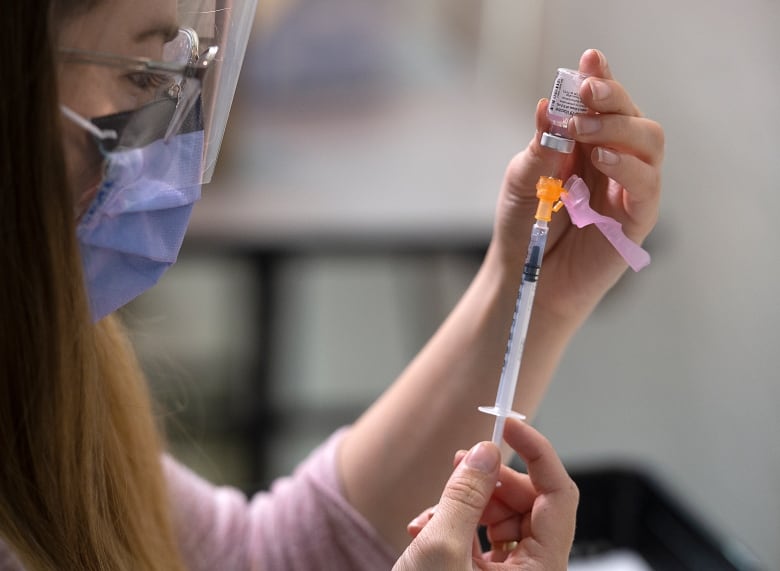
That is an excerpt from Second Opinion, a weekly roundup of well being and medical science information emailed to subscribers each Saturday morning. If you have not subscribed but, you are able to do that by clicking right here.
Canada is poised to battle again the extra contagious coronavirus variants that threaten to jeopardize reopening plans throughout the nation as a result of an enormous uptick in vaccine provide, a willingness from Canadians to get the pictures and a few promising new vaccine analysis.
Day by day COVID-19 circumstances, hospitalizations and deaths have dropped dramatically throughout the nation to ranges not seen because the fall, whereas shipments of vaccines are set to develop considerably — with greater than 5.3 million doses arriving subsequent week alone.
Up to now, greater than 28 million vaccine doses have been administered throughout Canada, about 72 per cent of eligible Canadians have no less than one shot and near 12 per cent have two.
But there have been rising considerations over the unfold of variants which have raised doubts about whether or not we are able to safely reopen society in Canada’s hardest hit areas, significantly because the United Kingdom grapples with the variant often known as delta, or B.1.617.
Regardless of the many uncertainties that lie forward, consultants say that early knowledge from the U.Ok. and a brand new research simply launched in British Columbia level to the identical method ahead — getting as many shot in arms as quickly as doable.
Variant vs. vaccines
A current research from Public Well being England (PHE) checked out simply how efficient the primary dose is in opposition to the delta variant.
The research discovered the Pfizer-BioNTech vaccine was 88 per cent efficient in opposition to symptomatic illness from the delta variant two weeks after the second dose, in comparison with 93 per cent in opposition to the B.1.1.7 variant, often known as alpha.
Two doses of the AstraZeneca-Oxford shot have been discovered to be simply 60 per cent efficient in opposition to COVID-19 signs from delta, in comparison with 66 per cent in opposition to alpha.
And a single dose of Pfizer and AstraZeneca have been every solely about 33 per cent efficient in opposition to delta.
Consultants say it is vital to do not forget that the research regarded on the vaccine’s means to forestall COVID-19 signs, which might vary from gentle to extreme, and the early estimates on vaccine effectiveness in opposition to the variants do not inform the entire story.
“One dose of the vaccine, whether or not it was Pfizer or AstraZeneca, nonetheless really offered fairly a little bit of safety in opposition to extreme sickness and definitely in opposition to hospitalization,” stated Prof. Jason Kindrachuk, an assistant professor and Canada Analysis Chair in rising viruses on the College of Manitoba.
“Sure we nonetheless have to get two doses, however you realize what? Even with a single dose these vaccines work amazingly properly.”
Kindrachuk says that whereas delta reinforces the necessity to totally vaccinate high-risk people, like older Canadians and the immunocompromised, getting pictures into as many arms as doable will proceed to decrease group transmission and the unfold of variants total.
“Any inhabitants that is not vaccinated is a tinderbox that is ready to blow up and drive numerous circumstances and hospitalizations and new variants,” stated Prof. Alyson Kelvin, an assistant professor at Dalhousie College and virologist on the Canadian Heart for Vaccinology and the Vaccine and Infectious Illness Group in Saskatoon.
“The perfect factor that we are able to do is stick with a vaccination plan and hold going with it till our complete inhabitants is roofed by not only one, however two doses. That is going to be the best technique — not attempting to get too caught up within the drama of a brand new variant.”
WATCH | How does the delta variant impression vaccine rollouts and reopening?
Two infectious illnesses specialists reply questions concerning the delta coronavirus variant — first recognized in India and often known as B.1.617 — together with the way it may impression vaccine rollouts and reopening plans in Canada. 5:12
Single dose has ‘substantial’ safety
New Canadian analysis from the B.C. Centre for Illness Management (BCCDC) additionally underscored the effectiveness of even only one dose of mRNA vaccines in opposition to the variants and offered new perception into the gamma variant, often known as P.1, for the primary time.
The preprint research, which has not but been peer reviewed, discovered {that a} single dose of both Pfizer or Moderna minimize the danger of COVID-19 for older adults by about two-thirds in the course of the peak of the spring wave in B.C.
The observational research checked out near 17,000 individuals aged 70 and older between April 4 and Might 1 — a vital time when each the alpha and gamma made up about 70 per cent of circumstances circulating within the province.
The researchers additionally concluded that single dose safety for older adults was solely “minimally decreased” in opposition to alpha and gamma, which they stated “reinforces” Canada’s determination to defer second doses of COVID-19 vaccines at a time when provide was restricted.
“Even on the peak of the pandemic and even with most viruses being these variants of concern, we confirmed substantial discount in threat amongst vaccinated older adults in comparison with unvaccinated adults,” stated Dr. Danuta Skowronski, the epidemiology lead on the BCCDC and lead writer of the research.
“It is significantly significant as a result of this single dose safety was offered throughout that substantial third wave — the height of the pandemic for us in B.C.”

Skowronski says the research supplies the world’s first vaccine effectiveness estimate in opposition to the gamma variant and was made doable because of the distinctive place B.C. discovered itself in, with a number of variants circulating on the similar time in contrast to anyplace else on the earth.
“We have been in a position to derive and present that safety was maintained in opposition to P.1, which remained an open query globally,” Skowronski stated. “So we’ve got addressed that query and proven comparable protections to B.1.1.7.”
Whereas BCCDC researchers weren’t in a position to analyze vaccine effectiveness in opposition to the delta variant, which had not but been circulating broadly in Canada on the time, Skowronski says the group has their sights set on it within the close to future.
“Trying on the knowledge, we may be optimistic that we’ll have a great per cent effectiveness in opposition to delta,” stated Kelvin, who was not concerned within the research.
“In fact we wish everyone to get the second dose however I nonetheless am very optimistic.”
However Skowronski cautions Canadians not to attract too many conclusions from the info rising from the U.Ok. on the delta variant, or anybody research, as a result of the truth that it is largely observational and must be backed up by real-world immunogenicity analysis, which measures the immune responses {that a} vaccine generates.
“It is a sign of concern associated to a variant of concern that warrants additional analysis, which is why we’re on it,” she stated. “Then we are able to react.”
‘Get the second dose’
Consultants agree the most important menace to Canadians in the mean time is not variants — regardless of the dizzying tempo of analysis being launched worldwide — it isn’t being vaccinated in any respect.
“Thus far for the variants that we’ve got encountered, about which there was preliminary shock and awe after which some settling of that, we have not seen a huge impact,” Skowronski stated.
“In the end, we nonetheless need to get the second dose in and that is serving to us reinforce and perceive why that could be crucial.”

Kelvin says the choice to delay second doses in Canada allowed for extra single dose protection, which in the end prevented the virus from infecting extra individuals, growing hospitalizations and deaths and will have stopped the emergence of recent variants right here.
“What we need to look ahead to is: are these viruses altering considerably? … We need to carry on high of what is going on on with new variants,” she stated.
“What we are able to all do is get vaccinated and attempt to cut back our contacts to scale back the chance for the virus to mutate — that is going to be the most important function that we are able to play in controlling variants.”
Kelvin says if Canada continues to drive COVID-19 ranges down throughout the nation, we must always have the ability to keep low ranges of group transmission — which is able to largely be pushed by pockets of people that aren’t vaccinated.
“We’re in a really totally different place than we have been definitely within the early components of this yr,” stated Kindrachuk.
“Vaccinations are going to maintain getting out and as soon as we hit that threshold, issues are going to alter very, in a short time. I believe they already are, however I believe they are going to change considerably within the subsequent few weeks.”
That is an excerpt from Second Opinion, a weekly roundup of well being and medical science information emailed to subscribers each Saturday morning. If you have not subscribed but, you are able to do that by clicking right here.







